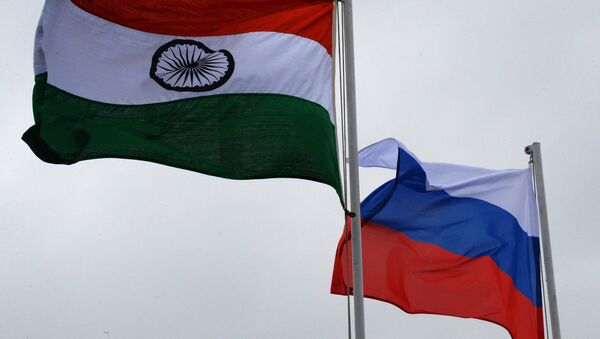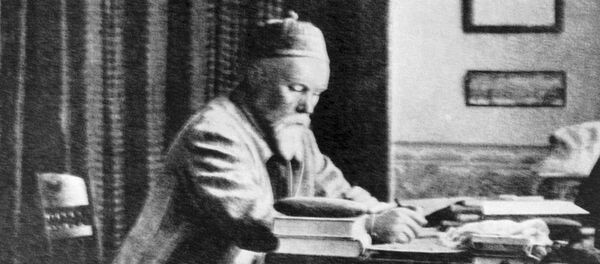New Delhi (Sputnik): The visit of Ambassador Nikolay Rishatovich Kudashev, the ambassador extraordinary and plenipotentiary of the Russian Federation to the Republic of India to Himachal Pradesh mainly focused on the legacy of legendary Russian painter and philosopher Nicholas Roerich.
The Roerich estate is located in Naggar, 25 km from Kullu, where Roerich came in 1927 from St Petersburg. He made the village his home for more than 20 years. The Roerich estate, now managed by a Trust, comprises the premises of the Indian-Russian Memorial Complex, the Gallery of N.K. Roerich, Helena Roerich Arts College and exhibition halls in the buildings of the Urusvati Himalayan Research Institute. Ambassador Nikolay Rishatovich Kudashev is also the vice-chairman of the Trust.
Sputnik: Your Excellency, you recently visited Himachal Pradesh and Indian press particularly covered it with much enthusiasm. How was your experience?
Nikolay R. Kudashev: Himachal Pradesh is truly considered the cradle of Himalayan wisdom and a true source of inspiration and ideas of the prophets and enlighteners of humanity. The illustrious Russian family of the Roerichs, whose unique artistic, scientific, philosophical and aesthetic heritage has become an integral part of world culture had made Kullu valley their second home. And it was a pleasure and privilege to visit this land.
READ MORE: Nuclear ABC: Rosatom Explains Nuclear Science to Indian School Children
Sputnik: What are your plans for further promoting this special relationship between Russia and Himachal Pradesh?
Nikolay R. Kudashev: Strong connectivity between Russian and Indian regions is yet another proof of sincere aspiration of our countries to deepen bilateral cooperation, and we believe the Governors' Forum, which is planned to be functional starting from this autumn, could benefit to the idea. It is high time we boosted this connectivity and fraternal relations between Himachal Pradesh with the Altai Republic of Russia, the Buryat Republic of Russia, and the Republic of Crimea and the North Caucasus regions.
Nikolay R. Kudashev: We are confident that the platform of the Roerich Museum in Naggar, which is believed to have got a second life as a precious fount of culture, arts and knowledge in the laps of the Himalayas with the strong support and meaningful guidance of Governor of Himachal Pradesh H.E. Mr. Acharya Dev Vrat and Chief Minister of Himachal Pradesh H.E. Mr. Jai Ram Thakur will open the doors for enhancing cooperation between Russia and Himachal Pradesh. These initiatives serve as a vivid embodiment of close spiritual and cultural ties between our countries and our people, which is of particular importance for us.
Sputnik: Roerich Pact, which will witness its 83rd anniversary this year, has played an important role in forming of international law standards and public activity in the field of protection of cultural heritage. Please tell us more about the significance of Roerich Pact in Modern times.
Nikolay R. Kudashev: It is a common knowledge that the pact formulated by Nicholas Roerich, an outstanding artist, scientist, and philosopher, was signed at a time when Hitler's fascism was already raising its ugly head in the heart of Europe, that is why the main purpose of this document was to create legal preconditions for saving cultural heritage and a wide range of cultural treasures, including historical and architectural monuments, museums, and institutions of science, art, and education especially in time of war and destruction.
The importance of the Pact cannot be overemphasized because nowadays cultural values are still under threat due to local armed conflicts, rampant extremism, and terrorist attacks. What is happening now in Syria, Afghanistan and Iraq, where monuments and museum complexes have been destroyed to the ground or looted, as well as some certain European countries make efforts to eradicate the sacred memory of the tragic events, enormous sacrifices and heroic feats during the World War II are the most vivid examples.
Nikolay R. Kudashev: It is heartening that we enjoy special and privileged strategic partnership between Russia and India and it is as strong as ever now. The main feature of our relations is not only mutual affinity between our leaders — President Vladimir Putin and Prime Minister Narendra Modi, who will meet this autumn during the Annual Bilateral Summit in India, but also unbreakable bonds established between our two peoples. The fruitful relationship between India and Russia is also reflected in the warmth and the corresponding fruitful relationship Russia has with Himachal Pradesh.
Sputnik: What are the newer scopes or avenues of mutual partnership between India and Russia?
Nikolay R. Kudashev: Our ties are constantly progressing embracing new spheres of cooperation, e.g. tourism, agriculture, high technologies, education, culture, especially yoga studies, etc.
READ MORE: India's Presence in Central Asia is Welcome — Russian Envoy
Sputnik: India and Russia have traveled a long journey together which is built on trust and warmth. Do you think the interaction has come down a bit in recent times and there is a need for renewed attempts to strengthen it? Specifically, in the sphere of people to people contact, veterans feel the mutual interaction amongst younger generation has thinned down. What is your opinion could be the reason for this shift and what should be done to revive it?
Nikolay R. Kudashev: The Russian-Indian relations can be easily characterized by an unprecedented level of trust and mutual affinity; there is a never-ending sympathy between people of our countries. Special and privileged strategic partnership is dynamically expanding year by year combining traditional spheres of cooperation as well as new areas, which are being actively explored.
Russia and India are facing the same multiple issues, from the threat of terrorism and drug menace to building a sustainable environment and promoting regional cooperation, especially for a larger Eurasia. People-to-people ties are the vital part of our relations, and we highly value the interest of young generations in contributing to our joint projects and bilateral relations. As for the "shift" — I was mentioning it earlier, it is not that Russia and India are running apart from each other, there are new vistas coming up our way and sometimes we are not able to capitalize on them. Let me assure you, we are using every opportunity to further expand our cooperation bilaterally and multilaterally.




